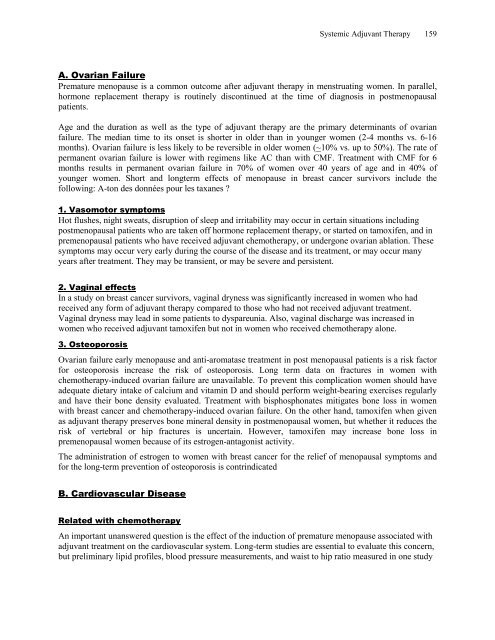Breast Cancer - Arab Medical Association Against Cancer
Breast Cancer - Arab Medical Association Against Cancer
Breast Cancer - Arab Medical Association Against Cancer
- No tags were found...
You also want an ePaper? Increase the reach of your titles
YUMPU automatically turns print PDFs into web optimized ePapers that Google loves.
Systemic Adjuvant Therapy 159A. Ovarian FailurePremature menopause is a common outcome after adjuvant therapy in menstruating women. In parallel,hormone replacement therapy is routinely discontinued at the time of diagnosis in postmenopausalpatients.Age and the duration as well as the type of adjuvant therapy are the primary determinants of ovarianfailure. The median time to its onset is shorter in older than in younger women (2-4 months vs. 6-16months). Ovarian failure is less likely to be reversible in older women (~10% vs. up to 50%). The rate ofpermanent ovarian failure is lower with regimens like AC than with CMF. Treatment with CMF for 6months results in permanent ovarian failure in 70% of women over 40 years of age and in 40% ofyounger women. Short and longterm effects of menopause in breast cancer survivors include thefollowing: A-ton des données pour les taxanes ?1. Vasomotor symptomsHot flushes, night sweats, disruption of sleep and irritability may occur in certain situations includingpostmenopausal patients who are taken off hormone replacement therapy, or started on tamoxifen, and inpremenopausal patients who have received adjuvant chemotherapy, or undergone ovarian ablation. Thesesymptoms may occur very early during the course of the disease and its treatment, or may occur manyyears after treatment. They may be transient, or may be severe and persistent.2. Vaginal effectsIn a study on breast cancer survivors, vaginal dryness was significantly increased in women who hadreceived any form of adjuvant therapy compared to those who had not received adjuvant treatment.Vaginal dryness may lead in some patients to dyspareunia. Also, vaginal discharge was increased inwomen who received adjuvant tamoxifen but not in women who received chemotherapy alone.3. OsteoporosisOvarian failure early menopause and anti-aromatase treatment in post menopausal patients is a risk factorfor osteoporosis increase the risk of osteoporosis. Long term data on fractures in women withchemotherapy-induced ovarian failure are unavailable. To prevent this complication women should haveadequate dietary intake of calcium and vitamin D and should perform weight-bearing exercises regularlyand have their bone density evaluated. Treatment with bisphosphonates mitigates bone loss in womenwith breast cancer and chemotherapy-induced ovarian failure. On the other hand, tamoxifen when givenas adjuvant therapy preserves bone mineral density in postmenopausal women, but whether it reduces therisk of vertebral or hip fractures is uncertain. However, tamoxifen may increase bone loss inpremenopausal women because of its estrogen-antagonist activity.The administration of estrogen to women with breast cancer for the relief of menopausal symptoms andfor the long-term prevention of osteoporosis is contrindicatedB. Cardiovascular DiseaseRelated with chemotherapyAn important unanswered question is the effect of the induction of premature menopause associated withadjuvant treatment on the cardiovascular system. Long-term studies are essential to evaluate this concern,but preliminary lipid profiles, blood pressure measurements, and waist to hip ratio measured in one study









